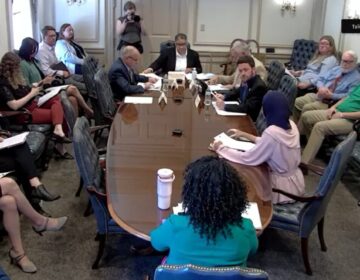After Delaware scandal, a conversation with charter school experts

Last Wednesday, the Delaware state auditor released a report detailing “unconscionable” fiscal impropriety at a local charter school.
The very next day, in a stroke of cosmic coincidence, the National Education Policy Center released “The Business of Charter Schooling,” a research brief that examines the ways charter leaders and management companies leverage their positions for personal gain.
Many of the arrangements, the brief says, are legal. Others bleed into murkier moral territory. Most revolve around the comprehensive and complicated relationships many charters have with outside management companies known as education management organizations (EMOs). Those arrangements can cover instructional materials, entire school budgets, or even real estate transactions.
As a result, the brief argues, many charter schools are funded through a dense network of closely affiliated private entities that siphon taxpayer money.
“It seems clear that the financial incentives embedded in state law, combined with the need for most of the companies to make a profit, have led EMO-run schools to operate in ways that are often at odds with the goals of charter school reforms and, ultimately, the public interest,” the report concludes.
NewsWorks/WHYY interviewed the report’s authors Rutgers University’s Bruce Baker and Western Michigan University’s Gary Miron to get a Delaware spin on their findings and hear more about their recommendations for reforming the charter sector.
What do they make of the recent scandals in the Delaware charter world? What do they think of the First State’s charter oversight?
The answers may surprise you.
Note: The following the interview has been edited for clarity and condensed for length.
You identify four problem areas in the charter sector and make eight recommendations. But if you could do just one thing tomorrow to reform the charter sector, what would it be?
GARY MIRON: My sense is that no matter what, these private companies and these for-profit groups, they’re private actors they’re going to game the system. I think the most important thing is that the authorizers have to oversee any contracts between the charter school board and management companies. We need especially the authorizers to be involved and oversee any decisions dealing with leases or the actual agreements with the companies so contracts are struck that are in the charter schools’ best interest and in the taxpayers’ best interest.
BRUCE BAKER: The ownership of assets is really critical here in terms of the long-term planning in how we’re going to educate our kids. Especially if we change our minds 15, 20 years down the line. We can’t be in a position where we look back and say we don’t have the capital assets to change our minds. We no longer own the buildings and land in populated urban centers to even provide the schooling we need to provide. We’ve given it away.
So much of the profiteering you describe in this piece relates to real estate transactions. And yet sometimes the beneficiaries aren’t the charter operators, but rather the financial institutions to whom they must pay higher interest rates. How often are the charter folks actually on the losing end of these deals?
GM: Being in Delaware, you’re in a perfect place to explore some of these things. You’re familiar with [Delaware Military Academy]. Have you seen their school? It’s architectural genius. It looks like a floating ship on a green meadow. And then you go to East Side Charter and they’ve been struggling with getting facilities over time. There was more variance in the quality of facilities in that state than I’d seen in other states. I’d never seen such extreme things. And that’s a lot because of the outside partners. A lot of the schools had social capital. So they tapped into and had connections. Then you have Wilmington Charter where they get this sweet deal from their school district where they get a free building! All these arrangements were so confusing and messed up. The net result was that you have the haves and the have nots.
[Editor’s note: A reader pointed out that the Charter School of Wilmington pays rent for its use of district faciliaties. According to the Delaware online checkbook, CSW paid $685,830.03 to the Red Clay School District for “buildings” in fiscal year 2015. In context, the use of “free” here refers to the fact that CSW did not have to build its own facilities or rent from a private landlord. It was permitted to use existing district facilities.]
In Delaware, we’ve had two recent cases where charter school leaders allegedly used school money to purchase personal items. These weren’t particularly sophisticated schemes, but they went undetected for years. Do you suspect that this sort of low-level criminal behavior is more common in the charter sphere than it is, say, in traditional public schools?
BB: I think that’s hard to say. I think what they have is more latitude to pursue personal gain within the boundaries of the law. They have more latitude to distribute resources to related entities in which they have financial interests in ways that enrich themselves down the lines without taking that step over the line legally.
GM: Why would you need to embezzle when you can just give yourself a pay raise?
Right now, Delaware charters are required to undergo an annual audit by an outside auditor. Some are calling for those annual audits to be done by the state auditor’s office. Do you think that would make a difference?
BB: Yes. One of the things I’ve seen elsewhere is that those external, independent accounting firms doing the audits on the charters are another related contracted entity. So they have interest in keeping the game going as anyone. Just like Madoff’s accountants. Certainly you would establish a greater distance between auditor and operator if the state itself were responsible for doing that.
You make eight recommendations in this brief, and almost all of them call for increased government oversight or regulation of charters. I think many would argue that to over-regulate charters or tie them closer to the broader public education bureaucracy would defeat the very purpose of these schools. What’s your response?
BB: One of the things that drives me crazy is kind of the bait and switch. People will say look at how great these KIPP schools are doing. Look at how great the New York charters are doing, the Newark charters are doing. That means we need to deregulate and open the doors, take off the caps, and allow more charters. We point to good charter schooling, which happens to be occurring in more tightly regulated environments, and then we use that as an argument for further deregulation. It’s nuts.
Do you have any sense of where Delaware falls in the spectrum of charter oversight?
GM: I rank it very high as a successful state. We see some states where the policy makers believe they will improve traditional public schools through competition. They don’t worry so much about the quality. They want lots of charter schools to threaten the public schools. And then they’re gonna shape up and start behaving better. That’s their theory. In other places they’re trying to get quality charter schools and they’ll share their innovations. Delaware is in the second camp. The schools are very diverse. You don’t see cookie-cutter schools there.
WHYY is your source for fact-based, in-depth journalism and information. As a nonprofit organization, we rely on financial support from readers like you. Please give today.





